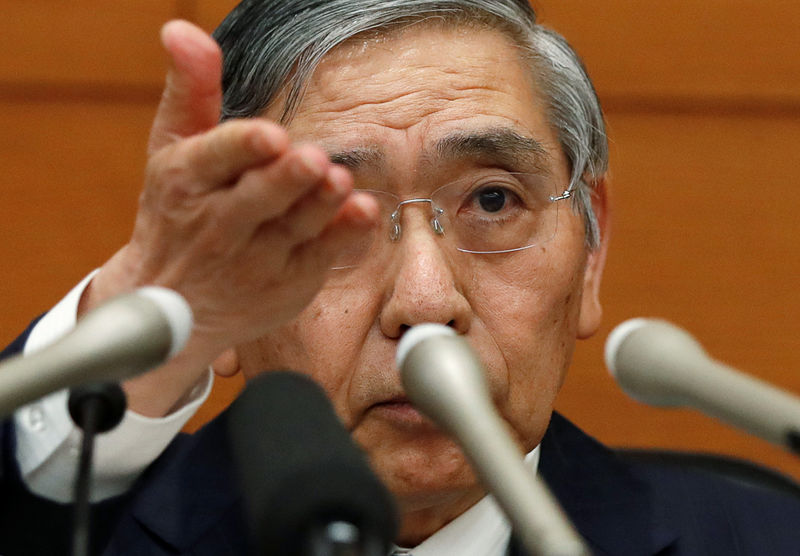By Leika Kihara and Stanley White
TOKYO (Reuters) - The Bank of Japan kept monetary policy steady on Thursday and its governor said economic improvements alone would not trigger a withdrawal of stimulus, reassuring markets it will lag well behind its overseas peers in ending crisis-mode easing.
Governor Haruhiko Kuroda stressed the need to "patiently" maintain ultra-loose policy, with inflation still distant from the BOJ's 2 percent target despite a strengthening economy.
Kuroda also rebuffed the criticism that prolonged easing could destabilize Japan's banking system, saying he saw no problem emerging in the financial sector, with lending on the rise.
"Our most important goal is to achieve our 2 percent inflation target at the earliest date possible," Kuroda told a news conference. "We won't raise interest rates just because the economy is improving."
As widely expected, the BOJ kept its short-term interest rate target at minus 0.1 percent and the 10-year bond yield target around zero percent - wrapping up a year in which the central bank made no change to policy.
The decision was made in an 8-1 vote. Board newcomer Goushi Kataoka dissented for the third straight meeting, arguing that the BOJ should buy long maturity bonds so that yields for durations of 10 years and longer fall further.
In a sign of its conviction in the strength of Japan's recovery, the BOJ revised up its assessment of capital expenditure and maintained its rosy view that the economy was expanding moderately.
Japan's economy grew an annualized 2.5 percent in July-September to mark a seventh straight quarter of growth. But core consumer inflation remains stuck at 0.8 percent and firms expect no major pick-up in price growth in coming years.
NO EXIT IN SIGHT
Some BOJ policymakers have recently expressed concerns over the perceived demerits of monetary easing, including the effects of very low interest rates on bank margins, suggesting the central bank may have to ponder raising its yield targets or slow purchases of risky assets next year.
But Kuroda said he saw no need now to modify the BOJ's policy framework, dismissing the view that the central bank should dial back stimulus on concerns over its rising cost and diminishing returns.
"We made clear in our comprehensive assessment last September that we will guide the yield curve to the most appropriate shape looking comprehensively at various factors, including financial conditions. We haven't made any changes to that idea since then," he said.
Kuroda added that the BOJ would not slow its buying of exchange-traded funds (ETF) simply because stock prices were rising, saying such a step would only be taken when inflation approaches 2 percent.
Most analysts expect the BOJ's next move to be a withdrawal of stimulus, but don't expect it until late 2018.
"The economy is on a solid footing but prices remain weak, so the BOJ is in no position to tighten anytime soon," said Hiroshi Shiraishi, senior economist at BNP Paribas (PA:BNPP) Securities.
"If it were to tighten policy, the first step would be to raise the 10-year yield target. But I don't think such a step will be taken in the foreseeable future."
